- Home
- Chaim Potok
I Am the Clay Page 2
I Am the Clay Read online
Page 2
The old woman turned to her husband. “We will go to the river.”
“What is on the river?”
“Perhaps a doctor for the boy.”
The old man looked at the boy. He lay very still beneath the quilts she had heaped on him. Cold snow, warm quilts. Where had she learned such things? Stubborn, crazy old woman. Even in old age she surprised him.
He took up the shafts of the cart and walked, following a line of refugees through the rubble of the main road. A grimy-faced little girl squatted alone on a pile of rubble, crying. He turned to his wife, warning her with a fierce look to leave the girl alone. Here and there bodies lay along the sides of the road. Dark and fetid odors in the air: torn earth, wrecked houses, broken sewage lines, rotting flesh. Starved dogs roamed about and he thought he might catch one but he had little strength for a chase after this day of pulling the cart.
Some time later he saw through the winter twilight the dull sheen of the frozen river.
The riverbank, its mudflat skin frozen to tundra ice, slanted down in a wide brownish scraggly slope from the shell-pocked stone houses along its upper edge. A silent horde squatted upon its surface inside thrown-together shanties and near discarded oil drums in which burned scavenged wood. The flames fed upon the air through holes poked into the drums and roared upward into the darkness, casting lurid reddish dancing patterns upon the frozen surface of the river.
Beyond the opposite bank of the river was an airfield. Huge aircraft rose and landed, wing flaps extended and wheels down, like giant herons, flying directly over the old man and his wife and the boy. Earth and air trembled at the roar of their engines. Spears of light on their wings pierced the darkness.
Squatting near a blazing oil drum while the woman cooked their rice, the old man gazed at the aircraft and the burning oil drums along both riverbanks and the play of light and shadow on the river, and a memory of childhood returned to him: living men suspended head-down from chains over open firepits. A nightmare from the time when the Japanese governed the land and stories were told of their cruelties to those who resisted their rule. The flaming wood crackled, showering forth a spray of sparks. He felt on his hands and face the pulsing heat of the flames and on the back of his head the glacial air of the night. Beneath him the riverbank had softened in the heat and was oozing mud. He watched as the woman prepared their portions of rice. She squatted near the shack, cooking on the small fire she had made of wood heaped upon three stones. There would be three portions. One for the boy.
Earlier she had bartered a handful of rice for a place in a shack put up by two starving old men from the city. She had spread their pads and quilts and then had left the old man behind to guard their belongings and had taken the boy in her arms across the frozen river. The old man had squatted near the fire outside the shack, and waited.
She was gone a long time. He grew wild with hunger and began to rage within himself. Does she still not know after all these years who comes first? First the husband, then the stranger. No children from her, no loyalty from her. A curse of a woman.
Years of bitterness woke within him, working like slow poison.
Still she did not return.
After many hours the anger yielded to anxiety and fear. He could not imagine a life without her. Who would prepare food and wash clothes and work with him in the fields? Alone in old age. The curse of evil spirits.
He squatted near the burning oil drum, scanning the dark-red body of the river, and finally he saw her emerge from the shadows with the boy in her arms. His heart leaped and trembled with joy, but he said nothing.
Hours before, she had carried the boy across the frozen river, light, light as a flying squirrel. Icy air in her eyes. The boy’s face beneath the shielding quilt. Will the dragon consume this one too? A double feast for his scaly belly. How he burns with fever! Another death in my arms. Where will we bury him? The first lies on the hill. His milk-name of no help: Long Life. The spirits took him to their world, leaving behind the clay of his body. But this one not yet dead. Dragon, be the dragon of courage in this one. Be the dragon that befits the jacket he wears, not the dragon of fire and death. Grandfather would fish the rivers with his net and rod, long-stemmed pipe in his mouth, straw basket on his shoulder. Why do they not fish this river? Frozen too far down? Or the river dead with poison from the war? Grandfather in the forest gathering pine brushwood for fire. No brushwood here. We will die on this riverbank. The boy will surely die. If I had a breast to give him. I am an old woman and still the spirits play with me. One son, one death. A strange boy, another death. Fire in my arms, ice beneath my feet. Play with me, pitiless spirits. An old woman. Shame, shame, you evil spirits, where is your shame? And where is the—ah, there, the shore, the riverbank. And the tent of help, where? The place of doctors and hospital medicine for our soldiers. The breathing stopped? No. Does such a fever not leave an incurable hurt? Shacks here more than on the other side. Is no one left in the villages? Our soldiers, where? The tent of doctors, where? Ah, the cross of red. What does the soldier say? No? Does he say no? Am I a cow, then, that he says no to me? Is the boy a dog? No? And the other? From the other also no? He points the weapon at me. They are here only for the soldiers? No and no? But see the boy! See the wound. He will die. Remove the fragment, seal the wound. A child. Surely. See. Then I remove it! Let him die here! The blood. Weak old fingers. Ah. Now. Here. See. Another death. I am a woman made for the dying of children. An earlier death punishes me. A grave wrongly placed? An ancestor poorly worshipped? But who? A long time inside the tent. They have forgotten me. Why do you still play with me, you vile and vicious spirits? I am an old woman who has been played with enough for two lifetimes. Am I outside your realm of mercy? What? What? What does he say? He shouts. Angry! The boy. They give him back to me. New bandage. Bleeding? No. His fire again in my arms. Now the old one will be angry. How he wishes him gone! Memories of the little one dead. Like this one: light and limp and burning. Breath gone? Ear to mouth. Not yet. Be careful—slippery. The shack, where? Ah. He waits on the edge, his belly empty. Angry, yes. Hold him, cover his face. This is not the jacket of a boy who works with a plow. Silk. Special buttons. Amber? Needlewoman. A mother? A grandmother? A yang-ban child? Demon dragon, away! Seek someone else on this frozen riverbank. One is enough. The old one wants his food. What to feed the boy? A soup of rice and the savor of a fishtail. Arirang, Arirang, O Arirang, The pass is narrow.…
The old man watched as she placed the boy on the pads and quilts and gently covered him.
He asked, “What did they say?”
“The army doctor would not see him.”
“So,” he said after a moment. “Why were you so long, woman?”
“When he said it, I removed the bandage from the boy and with my fingers pulled the splinter from his chest.”
The old man stared at her.
“I did not know the boy had so much blood left in him.”
He shuddered with fear and anger. The demons of madness have claimed her. The boy is a curse.
“They took him inside and I waited until they brought him out.”
“Who brought him out?”
“A doctor.”
“The doctor who would not tend to him?”
“He was angry.”
The old man was silent a moment. “Will the boy live?”
“The doctor said he will die. But there was another there who said if he does not die it will be because of the white powder the ambulance driver gave me.”
Then she had set about making their food.
Now she was feeding the boy soup made of melted snow and cooked rice and bits of fish. He was barely conscious and would not eat, but she crooned to him a song from her childhood and he ate and vomited and she cleaned him and fed him again and covered him and took up her own food and squatted by the fire, eating.
Somewhere in the fire-tinted darkness of the riverbank two men raised their voices in anger. A woman screamed. Food stolen? A fight for spa
ce?
Their supply of wood was gone. The man edged closer to the fire. He felt the warmth and emptied his mind of all thought of the woman and the boy.
The sky was black and icy with a wash of brilliant stars. Here and there along the riverbank the oil-drum fires began to die. The woman went into the shack and lay down in her clothes beside the boy beneath the quilts and the old man entered a moment later, bending down and sliding between the quilts. The boy lay between him and the woman.
The old man thought: The demons of the night will soon be walking on this riverbank. One will take the boy.
The boy lay shivering with fever. The woman sang to him softly:
Arirang, Arirang, O Arirang,
The times in which we live are most trying,
To this thousand miles of river and mountains
May peace and prosperity come.
The old man fell asleep.
Once in the night he dreamed the woman had given the boy her breast to suckle. He woke with the quilts over his head. The woman and the boy lay silent. The air beneath the quilts was warm with the heat of the boy’s fever. The old man went back to sleep.
In the morning he woke and came out of the shack and saw that some on the riverbank had frozen to death during the night. But the boy was still alive.
The woman remained with the boy while the old man went foraging for wood. The streets near the river seemed to have been picked clean and the old man wandered deep into the city. Dark-garbed scavenging shapes flitted through the rubble. Men and women wandering about dazed. Narrow side streets thick with refugees. Main roads noisy with military traffic. Was that the thunder of big guns? So close to the city? Only scraps and branches gathered so far and loaded upon the A-frame on his back. Not yet enough for a day and night of fire. If one could burn mud and stone. Perhaps break into a house? Police everywhere. Merciless. Looters they shoot.
He turned into a street crowded with refugees milling about and squatting upon the ground. A stench of dread and squalor thick in the air.
Afraid. His meager supply of gathered wood might be stolen from him if he passed through this street. He decided to return to the riverbank and soon found himself lost in narrow alleyways.
Shamed by his stupidity and fearful of attracting attention, he would not ask of others the right way but stumbled on, looking up and down the streets for the dull sheen of the river. But here the streets and alleys curved and he saw only more streets and houses and low stone walls. He wandered on and a pain began in his chest, a familiar pain, the pinpoint of pain that rose up in him whenever dread became overwhelming and he felt himself again the plaything of devils.
On one of the streets a small dog attached itself to him: tawny-skinned, ribs protruding, red tongue dangling, breath rising in brief steamy coils. He called to it and it approached warily and when he reached out a hand it shied away. He hurled a stone at it and it scampered off through an opening in a stone wall that seemed to have been sheared by a shell and lay partly in a heap of grayish rubble.
He paused, listening. The rumble of guns. He squatted down quickly near the broken wall to relieve himself and noticed jutting out from beneath a pile of stones the splintered edge of a piece of wood.
He stood and went to the stones and gazed down and then looked around. The broken wall fronted a courtyard and a stately stone house that seemed deserted. The narrow paved street was bordered by low walls and elegant homes. On the walls of some of the houses were the scars of bullets and shells. The wind made a strange high-pitched moaning sound as it moved among the homes.
The old man reached down and touched the wood and it was indeed wood and he moved away some stones and there was more wood and he moved away more of the stones and there was more wood still and he found himself after a few moments gazing down at a huge cache of shattered beams and broken boards with the nails still in them and two-by-fours and sections of wooden walls and doors. Someone’s secret hoard? For barter or sale? The spirits sent me here!
He placed the A-frame on the ground and cleared away the stones and loaded the A-frame with as much wood as he thought he could carry and replaced the stones and returned the A-frame to his back and hurried away, staggering slightly beneath the load.
The street sloped and he followed it, thinking it would lead to the river, and after some while there was the dark sheen of the frozen water. He passed through the row of riveredge city houses and entered the mudflats and walked among the refugees toward the shack, conscious of the wind on his face and the hard hot looks of those squatting about staring at his find of wood.
The woman when she saw the wood said only that the boy needed the warmth if he was to stay alive and quickly set about building a fire in the oil drum.
The two old men whose shack it was lay together inside a sleeping bag and chirped merrily when they saw the wood, and one asked if they were to be included in the woman’s cooking that evening.
The old man, his shoulders and back quivering from the weight of the wood and the effort of the hauling, went to the river’s edge, where the frozen mud met the frozen water, and squatted there and stared across the expanse of ice at the opposite shore and its horde of men and women and children. An aircraft as large as a ship lifted itself from the earth and lumbered by overhead in a tumultuous roar of engines, then banked and slowly vanished into the pale sky. The old man watched in wonder and terror. The machines of the foreigners. How can they be defeated, these giants of pale skin, these devils on our sacred soil? Yet the guns of the Chinese are closer now. The wood I carried will warm our bodies and keep the boy alive. She will want to bring the boy. Where will we run?
The woman came over to him in the course of the day and said, “The boy may live.”
“Then he can care for himself.”
Her eyes sparked. “Better to have left him in the ditch.”
“What are you saying, woman?”
“Will we heal him only to kill him?”
“What are you thinking?” He was angry. “Tell me!”
She said after a long moment, “This is talk about seeds that have not yet sprouted.” And she went away.
In the late afternoon the wind herded dull-gray clouds over the city and snow began to fall. The woman sat near her small fire cooking their food while the two old men and the boy lay in the shack. The boy was still with fever and called out from time to time: names uttered through gasps of breath. The two old men bleated with annoyance at his cries and told the woman to silence him, they could not rest for the noise, and the woman gave them a bowl of rice and they ate greedily and were quiet.
Many died of the cold that night on the riverbank and in the morning their bodies were set out on the upper level of the mudflats, near the row of houses. The bodies were frozen into grotesque shapes, some melting into the ice so they would have to be hacked out later by those coming to bury them. But the boy, still hot with fever, remained alive.
Again the old man went out for wood. He slowed his wandering through the snow-clogged streets lest anyone sense how near the river the cache was. He walked through streets crowded with refugees and listened to talk about the war: men, women, children forced by the soldiers from the North to dig their own graves and then shot; towns and villages burned. He fled from the talk and came upon the same dog he had seen the day before but it ran from him. At the broken wall he removed the stones and loaded wood upon the A-frame and replaced the stones, and then he returned to the riverbank with the wood.
Men and women squatting on the mudflats regarded him with pinched faces. Soon they will begin to follow me. Only in the land of good spirits do such treasures go on forever.
The woman looked at the wood and said nothing: it was not for her to praise her husband for an ordinary task. The two old men, seeing the wood from their sleeping bag in the shack, squealed with joy.
The boy lay still in the pulsing circle of warmth cast by the burning wood and it was now clear to the old man that he would not die.
The following morning the woman told him that soon there would be no more food.
He squatted at the river’s edge. A pitiless north wind gusted across the river. In the milk-white sky the yellow disc of the sun. Trucks rolling across the faraway bridge. Distantly the thump and thud of big guns. The Chinese like locusts in the fields. A dull heavy dread seized him. He remembered hunger, once from a time of river flood and again from a time of endless sun: firespears in his belly; locusts in his head; tremors in his arms and legs. Dark-circled vacant eyes and sunken faces and rotting gums. The long dying of his grandmother and uncle and others in the village. All turned into shriveled foul-smelling dolls. Hunger he dreaded more than war, more than death itself. A dark and leprous scourge.
He returned to the shack and removed the small square of cloth he kept in his coat pocket and spread it on the ground. From their basket of food he took a handful of rice and placed it on the cloth, which he then tied with care and replaced in the pocket. The woman, squatting next to the sleeping boy, watched the old man in silence, no expression on her small wrinkled features. He settled the A-frame on his shoulders and, bent beneath it as if it already carried its anticipated load, he left the shack.
The snow had hardened to a slippery crust over the frozen mudflats. More refugees had entered the city in the past two days; both riverbanks were a mass of men and women. No one was fishing the river. He gazed across the river, looking for the tent with the red cross where a doctor had angrily cared for the boy. Was it near the distant bridge? Removing the splinter from the boy’s chest with her fingers. All the early years docile as a cow, and then the death of the little one. A different person after his death. Holding him as he burned. First the village doctor. Then the sorceress. Helpless. Crying and burning. The boy buried on the hill and her first raging anger soon afterward at the plow that broke upon a rock in the field. The words that came from her. Much sense to wear the hat of mourning only for a mother and father: a wife is a stranger one can replace.

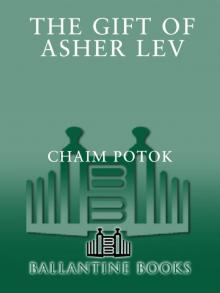 The Gift of Asher Lev
The Gift of Asher Lev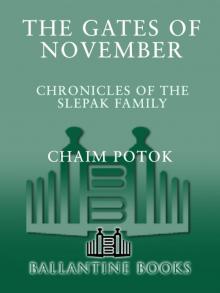 The Gates of November
The Gates of November In the Beginning
In the Beginning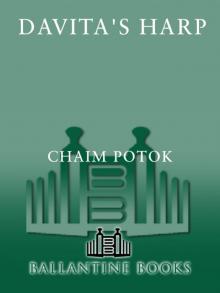 Davita's Harp
Davita's Harp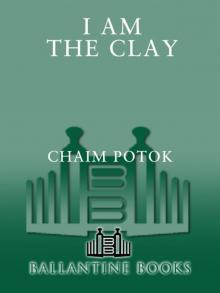 I Am the Clay
I Am the Clay The Promise
The Promise The Chosen
The Chosen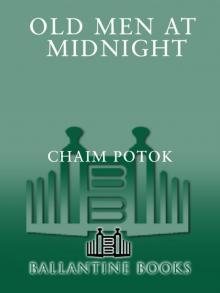 Old Men at Midnight
Old Men at Midnight My Name Is Asher Lev
My Name Is Asher Lev